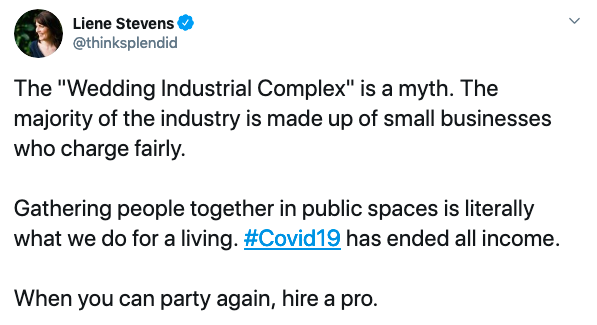I am in a high-end, luxury market with very, very wealthy clients.
Photo by Cameron Clark
This question is from a designer who also offers boutique specialty rentals:
First off, let me say how much I love all of your content. Thank you for everything you produced during 2020. I found it invaluable, and still follow your words regularly. I have another interesting topic I would love your take on:
I am in a high-end, luxury market with very, very wealthy clients. Lately, they are all cutting their day-of wedding details like stationery or rentals. Several have told me this is due to rising costs (thanks inflation and gas prices!) and the tanking stock market.
During the pandemic, I was flexible with clients and tried to get creative to share the financial burden of postponements and cancellations. But this year, I was planning on being the busiest I had ever been (which I am). So I limited the number of clients I took. I have planned my year financially based on their signed contract amounts, and I have turned away business because of that.
Now my clients are all cutting back. What is the best way to communicate to them that they are under contract and therefore are obligated to a certain spend?
I don’t want the negative feelings toward me or bad public reviews. But I have also planned my year based on these contracts. Every cut counts, and while $2,500 may be easy to make up somewhere else, a cumulative $100,000 is not.
I tried to communicate this to a client today, and her response was:
“I find it surprising and distressing that you are unwilling to make a straight adjustment to the order based on the number of attendees, and adjusting the total amount due accordingly. I recognize that adjustments to the quantities creates some stress for your business – but that is the business you are in. Other vendors have not responded the same way.
I would really like to remove the specialty glassware completely as our overall event costs have risen considerably beyond our budgeted amount.”
Answer from Liene:
The Short Answer
Likes are for Facebook, not contracts.
Economic Realities
A recession hasn't officially been called yet, but at this point it's almost a matter of semantics.
Regardless of labels, it's definitely starting to feel more like 2008 – topped with a layer of ongoing complications created by the pandemic.
These economic issues are also not limited to the United States. They are impacting everyone across the globe:
Inflation rates are up worldwide. In May 2022, inflation hit 8.6% in the US, 9.1% in the UK, and 11.7% in Brazil.
Fuel prices are up worldwide. In May 2022, the average cost of gasoline/petrol per gallon was $4.43 in the US, $5.79 in Brazil, and $8.29 in the UK.
Because of the separate crisis in Lebanon, the average price of gasoline is $75.55 per gallon.Wedding costs are minimum 40% more worldwide because of product shortages, increased labor costs, and supply chain issues.
And that 40% doesn't factor in the higher rent prices for studio/office/warehouse space, repayments on any new debt taken on to survive 2020, nor the raise wedding pros should have given themselves just to break even with inflation:
If you were charging $15,000 for your services in 2021, you need to now be charging $16,500 just to earn the same amount due to inflation alone.
If you were at $15,000 in 2020 and never raised it, you need to now be at $17,000 to earn the same amount.
A Splendid Tip: the exact numbers – as of April 2022 – are $16,486.46 and $16,717.23 respectively, but if you are using a luxury pricing strategy you want the price to end in either a 000 or 500 after the comma, so round up.
I don't know if you raised your prices high enough over the past two years to cover the increased costs and inflation. If you're like the majority of wedding pros, you did not.
This means that even though it may seem like you’re earning more from being so booked and busy, you were likely losing money this year – even before your clients started cutting their wedding budgets.
Luxury Client Myths
In addition to the financial issue on your end, your question highlights two myths that have a chokehold on the wedding industry:
The myth that the very wealthy approach their spending the same way no matter the state of the economy. People in every tax bracket attach emotion to money.
The myth that ultra luxury clients don’t negotiate. Or that great artists don’t either. Michelangelo and Leonardo da Vinci famously negotiated and I have yet to see a wedding that is more artistically visionary than the Sistine Chapel.
Yes, there are exceptions to the rule, but they are exactly that: exceptions. A key to both authentic optimism and success is operating with the mindset that you are exceptional, but you are not the exception.
Likes Are For Facebook, Not Contracts
Everything I’m about to say is written with the assumption that your contract is solid and was created by a legitimate attorney. If it isn’t, definitely hire a highly knowledgeable attorney to write a new contract you can use with future clients. Contracts are important no matter the client, but perhaps more so when your clients have the type of wealth that can keep you tied up in court forever.
In order to have the bandwidth needed to produce high-quality work for your clients, you stopped accepting new business for 2022 once you signed enough contracts to meet your financial goals for this year. A healthy work ethic always includes boundaries and you did the right thing by recognizing and honoring your limits.
You took your clients at their legal word that they would pay what they agreed to. You are not naive or lazy or failing to plan for your business by turning away potential clients based on contracts you had in hand. Protecting your company, your employees, your family, and yourself by upholding your contracts does not make you mean, heartless, nor a diva. It makes you a responsible business owner.
Still, recessions are difficult for everyone, regardless of income level and I will admit I was feeling for your client until I got to this line in her email:
“I recognize that adjustments to the quantities creates some stress for your business – but that is the business you are in. Other vendors have not responded the same way.”
Please do not fall for this manipulative argument.
I don’t doubt that her “overall event costs have risen considerably beyond our budgeted amount.”
Of course they have. As I noted earlier, weddings are at least 40% more expensive this year. The problem is she is discovering this after she signed contracts.
This is not the same situation as 2020. She is not cutting her guest list because of legally-mandated gathering size limitations or event bans. She is cutting it because the global supply chain is still tied in knots, the economy is not doing so hot, and she lost money in the stock market.
She is also not being entirely truthful. If her other wedding vendors were all lowering their contracted amounts like she wants you to believe, then she wouldn’t be over budget.
At least one category ended up costing way more than she planned (very likely flowers or food) and she is trying to pay you less than she contractually agreed to in order to make up for it. Wall Street certainly isn’t going to give her any lost money back, so she is hoping that you will bend because you are a nice small business owner.
There is a difference between being nice and being kind. Niceness is skin-deep sugar, kindness is bone-deep substance.
Your client is not skipping mortgage payments to pay for this wedding. The income you draw from your business does pay your mortgage. It would be nice of you to lower your contracted minimum spend for her, but it would not be kind to anyone who depends on you to financially provide for them – including yourself.
Do not set yourself on fire to keep others warm. Especially for wealthy clients who already have plenty of Hermès blankets.
Negotiating for Value
Money may be an amoral, inanimate object but we still tend to attach emotion to it. Because of this, even Ultra-High Net Worth Individuals who are unlikely to ever find themselves in a truly precarious financial position can get in their feelings about money during times of economic uncertainty.
Contracts can be negotiated after they’re signed – that’s what addendums are for. The thing about addendums is that they have to be agreed to by both parties. Your client can’t change the contract terms without your approval and vice versa.
You may not be in a financial position to lower the contracted minimum spend amount, but that doesn’t mean you can’t still offer to negotiate other ways to deliver value.
Is there a way to upgrade or offer her alternative options that doesn’t cost you additional revenue or profit but allows her to meet her spend minimums at the new guest count?
This was very common in 2008: people cut their guest counts but hotels and wedding venues still held them to their contracted food and beverage minimums. To meet the spend, they upgraded to only top-shelf liquor for the bar. They served steak, lobster, and caviar instead of a more limited menu. They had fewer wedding guests, but those guests were treated to a better experience.
Another thing to consider is how she might prioritize which details matter most to her. This will be different client to client.
As an example: There was a UHNWI mother of the bride who hosted a ton of events and always hired people to help her. She was every event pro’s dream repeat client.
Except that she just did not care about chairs. She wouldn’t even spring for the basic padded folding chairs – they had to be those uncomfortable resin ones that turn beige in 2.5 seconds because they show every speck of dirt.
She wouldn’t bat an eye at dropping six-figures on flowers for a birthday party, though. She had no problem ordering top of the line custom linens for a luncheon. She happily spent $15 a pop on 100 novelty lollipops for a baby shower. Her stationery was always letterpressed or engraved. Yet every single party had those hideous chairs, no matter how much her planner and event designer pleaded.
In her head, spending more on chairs meant she was bad with money and she was not about to be bad with money.
Right now your bride feels like the glassware is an irresponsible splurge, but you may have something else in your inventory that she would place a higher priority on. Can you offer to swap the items so that she feels more comfortable spending the minimum?
If you can negotiate the specific products without compromising your finances, that may be a win-win option.
If you don’t have alternatives available, then you don’t have them, and it’s still okay to still require your client to fulfill the contract as written.
Replying Tactfully and Professionally
When you reply to this bride (or other clients), do not apologize for not being able to lower your contracted minimum spend.
You have done nothing wrong and courts sometimes consider an apology to be an admission of guilt. There is a reason every good attorney has some variation of “never apologize, never explain” as a mantra.
This does not mean you have to be cold. You can be warm, friendly, and professional while not accepting blame nor taking her guilt-trip bait of “other vendors have not responded the same way.”
Another wedding pro’s business decision is literally not your business. You are not involved in running their company and you do not need to share responsibility for nor emulate their choices.
They may have more of a financial cushion that allows them to make an exception for her. Or they may be letting a codependent need to have everyone like them drive their financial decisions. Again, likes are for Facebook.
If it’s more of an identity issue for her, dressed up in a financial issue – and she doesn’t see value in substituting – she is likely always going to feel like you took advantage of her. Those feelings are not facts.
Sticking to a contract she agreed to is not taking advantage of her.
Costing her additional money in ways she has no idea about like secretly marking up a vendor’s retail price would be taking advantage of her.
This is not that.
If you can offer other ways to negotiate value, that is a kind gesture. If you can’t, then you can simply say that you are unable to adjust the contracted rates.
You have bills to pay and mouths to feed and the promise she made when she signed her contract is how you do that. This may be her wedding, but it is your livelihood.
Questions from Wedding Pros
Have a question on a sticky client issue, running a wedding company, or an aspect of business you feel you should know by now yet don’t?
Liene is happy to weigh in with her trademark compassionate yet no-nonsense advice.
To submit a question to our Wedding Pro Q+A column, send us an email. We’ll keep you anonymous.
Written by
LIENE STEVENS
Liene Stevens, the founder and CEO of Think Splendid, is an author, speaker, and award-winning business strategist. Armed with $2000, a healthy work ethic, and an undeserved dose of privilege, Liene bootstrapped Think Splendid from a scribble in a notebook to a successful wedding business consulting firm with a client list spanning 97 countries.






















